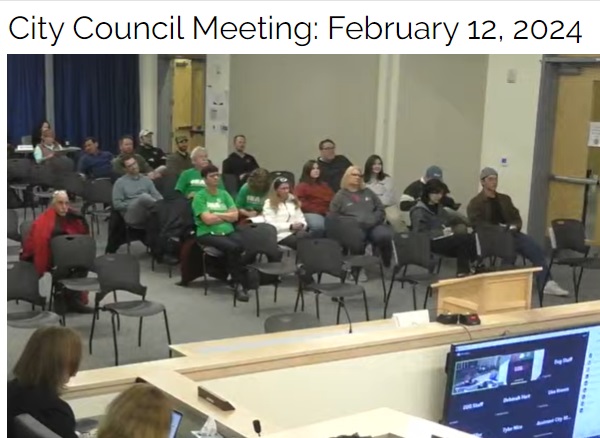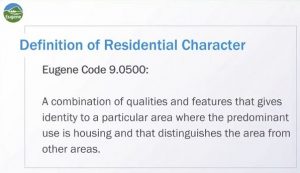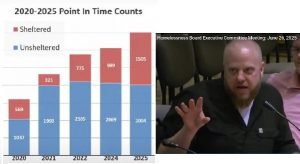Public comment: Eugene needs more than 1 animal welfare officer
7 min read
Public comments Monday night included sharp criticism of a number of EWEB and city decisions. On Feb. 12:
Alan Gormezano: I’ve been away for seven years. And while I was away, I got a message saying that there’s going to be a smart meter put on my house unless I opted out. So I opted out.
[00:00:18] Then it was changed to: ‘We’ll put a smart meter on your house, but we won’t turn it on.’
[00:00:24] Next it will be probably: ‘We’ve got a smart meter on your house and we will turn it on.’
[00:00:30] I went out to the EWEB meeting last week and among the community comments, I heard not one comment in support of these smart meters.
[00:00:40] I’m angry that the city is financing this, that so many people in this town have objection to. And I hope that the city can either take back that amount of funding or earmark that it does not go towards hiring some third-party company, which I got a robocall from today saying, ‘We’re coming to put a smart meter on your house.’
[00:01:03] Our money is being wasted that way. There is no need for all of us, especially those who do not want to have a smart meter to be put on our house. So please, I ask you to take action on this, and I thank EWEB for everything else they do, but this one just feels like an invasion.
[00:01:22] And many people at that meeting did say they did not want anyone trespassing on their property from EWEB, unless it was to just come and read the meter, which we’re all fine about that.
[00:01:34] Janet Ayres: Another speaker will be addressing the middle housing amendment—an abject failure by the city leaders in passing that plan. The federal portion of that was turned down years before and it’s put (as I understand it) the city in quite a legal pickle. I hope it does not go forward.
[00:01:59] (We’re) already receiving bills from EWEB advising that due to infrastructure to expect your energy bills to rise substantially. Not all of us have $100,000 salaries. We’re at an age of baby boomers, probably the largest group of babies that are now in retirement on fixed incomes.
[00:02:24] And it’s disappointing that the homelessness and the garbage and the criminality can’t be addressed as swiftly as that middle housing amendment was passed by this council.
[00:02:38] So I would like to suggest that they do their homework and study the issues and pick up a paper because it is a working role. You may not be as heavily compensated as you would like, but we the people are relying on you to represent us and not big investors coming—’carpetbaggers,’ is what I call them—coming from out of town, reaping public dollars to the benefit of themselves, and then leaving town. We’ve got Hynix to point to as an example of that.
[00:03:15] And with the real estate, commercial real estate, I drive around town, signs all over. All over. And it’s quite a little game, how that’s played out with commercial real estate and private equity firms. If the working public, if the news junkets could get that message out, how that game is played, Mr. (Mike) Clark, it’s shocking. It’s stunning.
[00:03:40] Charlie Rojas: Charlie Rojas. Last year, Oregon Court of Appeals struck down Eugene’s middle housing code amendment. The ruling was a harsh rebuke and repudiation of Eugene’s political administrative apparatus, implying you didn’t know what you were doing and that you failed to adequately plan for needed infrastructure essential for your dense housing schemes.
[00:03:55] Many of us warned you the middle housing amendment was against the law; you were going to be sued and you were going to lose. Turns out we were right. Why did you recklessly and foolishly push ahead with an ordinance so obviously out of code?
[00:04:07] The answer is to be found in the Housing Opportunity Mobility and Equity (HOME) Act of 2019 sponsored by New Jersey Democratic Sen. Cory Booker. Booker didn’t draft this legislation. It was written by unelected lobbyists in the pocket of institutional investors.
[00:04:21] The HOME Act was rolled into Build Back Better and became the housing platform for that bill. The HOME Act demanded that in order for states and cities to receive both HUD and surface transportation block grants, they had to do what the bill mandated. It was blackmail and coercion done under the guise of inclusivity and housing affordability.
[00:04:38] Some of the other requirements were elimination of off-street parking restrictions, removing height limitations on construction because the claim was if a neighborhood didn’t want unlimited cars parked on their streets or huge apartments looking into the residents’ backyards, they were ‘white supremacists attempting to impose institutional racism.’
[00:04:56] But the one element that deserves attention is the one that they said was establishing density bonuses, defined as increases in permitted density of a housing development, conditioned upon the inclusion of affordable housing in the development.
[00:05:08] The middle housing amendment wasn’t done to fulfill your supposed social justice agenda. It was done because investors wanted more money from federal subsidies and wanted to squeeze as much income as possible.
[00:05:19] Neither Build Back Better nor the HOME Act passed. You created an ordinance predicated on a federal bill that doesn’t exist. Neither the state of Oregon nor you could wait long enough to make sure that Build Back Better or HOME Act was enacted. Because all you could see was the fact that it was going to be, according to the Congressional Budget Office, up to $2 (trillion) to $5 trillion, which you expected to have some portion of it for your developers (or your investors, actually).
[00:05:43] Oregon HB 2001 was approved in 2019, same year the failed HOME Act was proposed. This council passed the middle housing amendment in May of 2022, months after Build Back Better was voted down. This is a straight stupid decision.
[00:05:59] Vanessa Ringgold: My name is Vanessa Ringgold, and I’m here to speak about the lack of animal welfare officers in the Eugene Police Department.
[00:06:05] So the animal welfare department is crucial in investigating and prosecuting animal abuse, neglect, and abandonment, patrolling for city animal ordinance violations, as well as transporting stray animals and animals in need to either Greenhill or for emergency veterinary help.
[00:06:21] My experiences in animal rescue, particularly during the budget negotiations last year, as well as more recently, has indicated that Chief Skinner and the leadership of the Eugene Police Department has sacrificed—if not purposely trying to sabotage—the Eugene animal services by purposely not even advertising the open animal officer position.
[00:06:43] So this time last year, the animal welfare department had a supervisor and two officers. One officer was sacrificed during the budget negotiations, even though the police took that department, is constantly asking for a greater budget, and there’s a pool from the public safety tax that could be used to pay for animal officers.
[00:07:02] A few months ago, the only animal welfare officer that the Eugene Police Department had put in notice. Since then, there has been no job posting. There has been no action into trying to replace this person. And this is a funded position. This is all of our taxpaying money that is not actually being utilized to help the people and animals of this community.
[00:07:23] So as we speak, there’s a single animal welfare supervisor, who really shouldn’t be doing field work, trying to service a community of over 170,000 people and countless animals.
[00:07:33] And what has been intimated to me during this entire process is this is a purposeful decision on the part of Chief Skinner who as I will summarize in my own words: ‘He doesn’t want to.’ We all have work that in our job descriptions we don’t want to do. We have to do it anyway.
[00:07:47] And so the ask tonight is for this city council, as well as city manager, to make sure that this position does get filled. It’s fully funded and desperately needed for the animals and the people in this community.
[00:07:58] John Q: After the close of public comment, Councilor Emily Semple:
[00:08:02] Councilor Emily Semple: Vanessa, thank you for coming and bringing up the animal welfare officer. This has been a concern of mine since the beginning when we only had one. And a part of what the community safety initiative was to include a second one. As you have noted, that has not happened. And so I would like some information, city manager, about what’s happening with the animal welfare officers and the funding. It’s a concern. So thank you, Vanessa.
[00:08:37] John Q: During public comment Feb. 12, sharp criticism of councilors and staff about EWEB rates, smart meters, middle housing, and why the second-largest city in Oregon has just one animal welfare officer.



